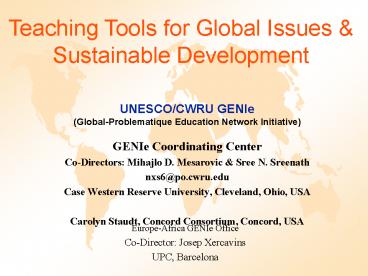UNESCOCWRU GENIe GlobalProblematique Education Network Initiative - PowerPoint PPT Presentation
1 / 19
Title:
UNESCOCWRU GENIe GlobalProblematique Education Network Initiative
Description:
Virtual Classroom exercises with other GENIe high schools. Hanover 2000 (UNESCO booth) Dialogue of Youth for 21'st Century on Sustainable Development. September 2000 ... – PowerPoint PPT presentation
Number of Views:43
Avg rating:3.0/5.0
Title: UNESCOCWRU GENIe GlobalProblematique Education Network Initiative
1
UNESCO/CWRU GENIe(Global-Problematique Education
Network Initiative)
Teaching Tools for Global Issues Sustainable
Development
- GENIe Coordinating Center
- Co-Directors Mihajlo D. Mesarovic Sree N.
Sreenath - nxs6_at_po.cwru.edu
- Case Western Reserve University, Cleveland, Ohio,
USA - Carolyn Staudt, Concord Consortium, Concord, USA
Europe-Africa GENIe Office Co-Director Josep
Xercavins UPC, Barcelona
2
GLOBESIGHT
3
Objectives of GENIe
- Immediate
- Pilot global issues and sustainable development
education at the high school level based on
developed methodology - Virtual Global Classrooms
- Long-term
- Establishment of national and regional virtual
classrooms - Educating decisionmakerspresent and future and
the public-at-large on how to reduce the gap
between the science and policy domains. - Research on how to pursue bridging the gap and
educational efforts.
4
International Organization Cooperation
- UNESCO
- Green Cross, Geneva, Switzerland
- GENIe Europe/Africa Coordinating Center,
Barcelona, Spain - World Water Council
- Senior Board of the Social Science Council
5
GENIe - University Network
- Argentina Univ. Rosario
- Botswana Botswana Univ.
- Brazil Candido Mendes Univ.,Rio de Janiero
- China Tshingua Univ., Bejing
- Equador Univ. San Francisco
- Germany Trier Univ., Trier
- India Jawaharlal Nehru Univ., New Delhi
- Japan Chiba Inst. of Technology., Chiba
- Mexico UNAM, Mexico City
- Morocco Mohammed V Univ., Rabat
- Nigeria Univ. of Lagos, Lagos
- Portugal European Univ., Lisbon
- Russia St. Petersburg State Univ., St.
Petersburg - Spain UPC, Terrassa, Barcelona
- Turkey Bilkent Univ., Ankara
- USA Case Western Reserve Univ., Cleveland, Ohio
6
GENIe - High School Network (Under Development)
- Founding Members
- Gilmour Academy, Cleveland, USA
- Hathaway Brown, Cleveland, USA
- Upper Canada College, Toronto, Canada
- St. Marys High, Panama
- Members under consideration
- Secondary Schools associated with GENIe Univ.
Members
7
Support From UNESCO GENIe for Qualifying Pilot
Schools
- Notes on Global Issues and Sustainable
Development (samples) - Teacher Training on Future Studies
- Methodology
- Software
- GLOBESIGHT
- Travel Support for GENIe activities/meetings
- Global Virtual Classroom
- Issue based interaction with other GENIe schools
from around the world
8
GENIe Pilot Qualifying Criterion
- 1. School Administration commitment
- Identify High School teacher(s)
- Social Studies and/or Science
- Grades 9-12
- Provide Resources
- Time relief to develop course for Teachers
- Computer and Internet access (e-mail/WWW)
- 2. Teacher(s) use methodology and materials
(notes and GLOBESIGHT software) in selected
course - Significant part of existing course or a separate
course - 3. Schools provide feedback and share ideas and
any teacher developed material with GENIe
9
GENIe Pilot Qual. Criterion 2
- 4. Participate in GENIe activities
- Virtual Classroom exercises with other GENIe high
schools - Hanover 2000 (UNESCO booth)
- Dialogue of Youth for 21st Century on
Sustainable Development - September 2000
- Annual GENIe Conference (Europe/USA)
10
GENIe High School Pilot Timeline
- 1. Contact GENIe by e-mail for application form
- Return application
- Selected schools will be informed
- 2. Teachers in selected school choose one or
more GENIe selected issues to study
sustainability - population, health, climate change or water
resource sustainability - Teaching material and references provided
- 3. Have students develop detailed issue based
essays - 20-25 pages (double spaced, 12 pt font)
11
GENIe High School Pilot Timeline
- 4. Teacher chooses 2 best student essays and
sends to GENIe for qualification - 5. One Teacher and one student from qualified
schools will be invited to Cleveland, Ohio, USA
for a 5 day GENIe Retreat Training - All local expenses covered
- Travel grants available for a small number of
schools - 6. Preparation and planning for Expo 2000 at
Hanover (September 2000) during retreat - 7. GENIe Annual meeting December 2000 in
Europe/USA
12
APPROACH
13
Basic Principles of Future Studies
- Scientific Integrity
- Model only if scientific data and scientific
knowledge is available. Do not model what is
not modelable. - Transparency
- Reduced form models for decisonmaking, education
and the public domain. - Focus on Problematique Integrated assessment.
- Participatory Symbiotic Reasoning Process
- Interactive assessment human inside models.
14
GLOBESIGHT Architecture
Information Base
Models Base
ANALYSIS SUPPORT SYSTEM
Functionalities Base
Issues Base
Human
15
GLOBESIGHT INFORMATION BASE
- Dimension
- 196 Countries
- 21 Regions
- 5 Continents
- Data Source
- UN, World Bank, World Resources Inst., World
Watch Inst., Journals, CIA World Fact Book,
Reports, etc.
16
GLOBESIGHT MODELS/ISSUES BASE
LEVELS
Carrying Capacity
Integrated Development
Climate Change
Sustainable Development
A. Water Stress Scarcity, Global B. Water
Stress Scarity, Regional/National
C. Maximal Food Production Model D. Food
Data-base/Model
K. Oil Reserves, Ultimate Recovery, Global L. Oil
Reserves, Ultimate Recovery, Regional
M. Energy, Total Primary N. Energy, Mix
17
Challenges for Development Policies in the 21st
Century
Complexity
Uncertainty
18
Thanks To...
- UNESCO
- David Lucille Packard Foundation
19
END































